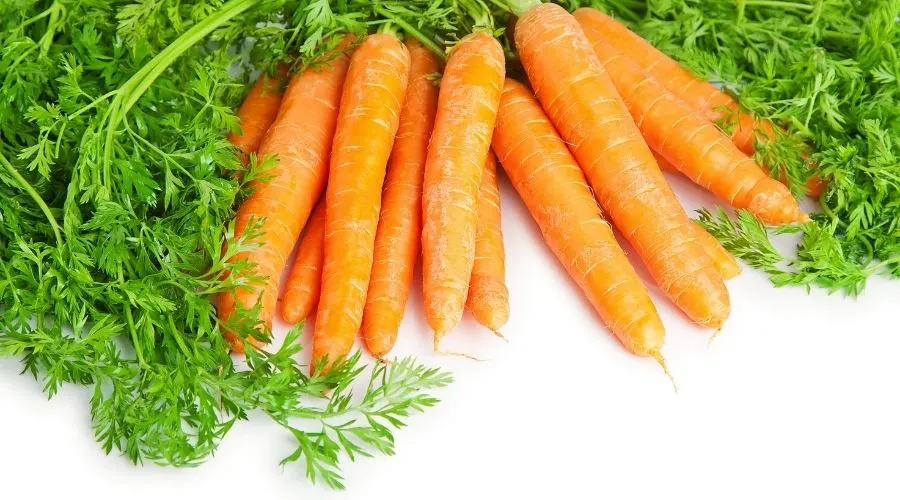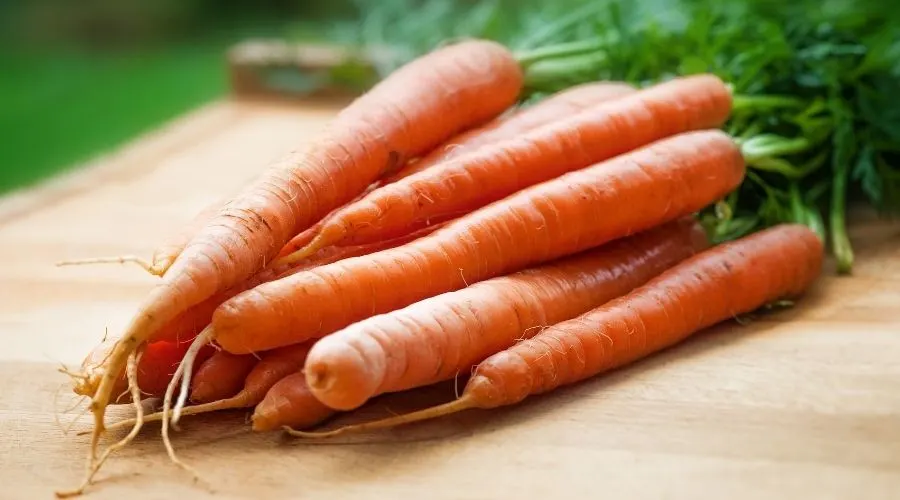We’re often told that raw vegetables are the healthiest option because they retain more nutrients than those which have been cooked. However, not everyone likes the texture of raw vegetables, especially carrots, which can be tougher to eat, so they opt for cooked instead, but are they losing out?
The short answer is that raw carrots retain more nutrients than cooked carrots, but cooked carrots are still a healthy option and are high in many vitamins and minerals.
Read on to see the complete comparison and the actual difference in each nutritional category between raw and cooked carrots.
Also in This Article
In a hurry, or looking for something specific? Use the links below to jump to the relevant section:

Raw Vs. Cooked Carrots Nutritional Comparison
Starting with the nutritional comparison between raw and cooked carrots and to make sure the data is as accurate as possible, I’m using data from the UDSA FoodData Central (source links at the bottom of this page).
The comparison is weight-for-weight (per 100g of carrot), and neither kind of carrot has any added ingredient such as fat or salt.
Calorie Comparison
USDA data confirms that raw carrots contain slightly more calories per 100g than cooked carrots. However, neither kind of carrot can be classed as high calorie, and there’s only 6kcal between the two types.
| Carrot Type | Calories Per 100g |
| Raw Carrots | 41kcal |
| Cooked Carrots | 35kcal |
Why Raw Carrots are Higher in Calories than Cooked
You might be wondering why raw carrots are slightly higher in calories than cooked carrots and would be forgiven for expecting them to be the same. However, this is often the case for most vegetables boiled in water when comparing them against the raw version.
The reason is that cooked carrots have a higher water content at 90.2g per 100g of carrot compared to raw carrots, which contain an average of 88.3g of water. There is also a slight reduction in carbohydrates and naturally occurring sugars, leading to slightly fewer calories.
Nutritional Comparison
The table below shows the nutritional comparison between raw and cooked carrots, and as you can see, there’s a slight reduction in each kind when carrots are boiled in water.
This means that raw carrots are slightly higher in carbs, natural sugars, natural fat, protein, and sodium, although interestingly, cooked carrots are marginally higher in fiber.
| Nutrition Type | Raw Carrots (Per 100g) | Cooked Carrots (Per 100g) |
| Carbohydrates | 9.58g | 8.22g |
| of Which are Sugars | 4.74g | 3.45g |
| Dietary Fiber | 2.8g | 3g |
| Fat | 0.24g | 0.18g |
| of Which is Saturated Fat | – | – |
| Trans Fat | – | – |
| Cholesterol | – | – |
| Protein | 0.93g | 0.76g |
| Sodium/Salt | 69mg | 58mg |
Vitamins & Minerals Comparison
When comparing the vitamin and mineral content of raw and cooked carrots, in most cases, vitamins and minerals are found in slightly higher levels in raw carrots, including vitamin C and potassium.
The USDA data shows that higher levels of some nutrients were found in cooked carrots, including vitamins A, E, and Iron.
It’s important to point out that all of these differences are minimal, and although there are more nutrients in raw carrots, cooked carrots are still a healthy vegetable option if you don’t like raw ones.
| Vitamin/Mineral Type | Raw Carrots (per 100g) | Cooked Carrots (per 100g) |
| Calcium | 33mg | 30mg |
| Iron | 0.3mg | 0.34mg |
| Phosphorus | 35mg | 30mg |
| Potassium | 320mg | 253mg |
| Magnesium | 12mg | 10mg |
| Thiamin | 0.066mg | 0.066mg |
| Riboflavin | 0.058mg | 0.044mg |
| Vitamin B6 | 0.138mg | 0.153mg |
| Vitamin C | 5.9mg | 3.6mg |
| Vitamin A | 835mcg | 852mcg |
| Vitamin E | 0.66mg | 1.03mg |
| Niacin | 0.983mg | 0.645mg |
| Zinc | 0.24mg | 0.2mg |
*mcg = microgram (1000th of a milligram) / mg = milligram (1000th of a gram)

Flavor/Texture Comparison
When it comes to flavor and texture, it’s not easy to judge which is best because it’s down to the individual which they prefer.
Raw and cooked carrots are very different when it comes to texture, and raw carrots have a stronger carroty flavor. Not everyone likes the texture of raw carrots because they’re tougher to eat.
So, to get a range of opinions, we’re taking a poll to find out whether raw or cooked carrots are the public favorite.
Please submit your vote below (no personal information required) to help us find out which is your favorite and once you vote, the winner so far will be revealed.
Summary
After comparing the nutritional data between raw and cooked carrots, here’s a summary of the key differences between the two:
- Cooked carrots contain fewer calories per weight than raw because they have a slightly higher water content but are somewhat lower in carbs and natural sugars.
- Raw carrots are higher in carbs, sugars, protein, naturally occurring fat, protein, and sodium.
- Cooked carrots are lower in some vitamins and minerals (including vitamin C and potassium) than raw carrots, but some are retained during cooking.
- Although raw carrots are higher in most vitamins and minerals, cooked carrots are still a healthy option if you don’t like raw, and in many cases, the differences are slight.
Ultimately, it all comes down to which you like best, but hopefully, this article’s data can help you work out which kind suits you and your diet.
More Raw Vs. Cooked Carrots FAQs
Raw carrots retain slightly more natural sugars than carrots that are cooked in water, but the difference is minimal with less than 1g per 100g of carrot. Both kinds of carrots are relatively low in natural sugars when compared to some other root vegetables.
The benefits of cooked carrots are that they’re slightly easier to eat because they’re softer, contain fewer calories than raw carrots, and are still high in certain nutrients such as vitamin A.
Related Articles
I hope this article has helped you to find the information you were looking for; you might also find the following articles helpful too:
Canned Carrots Vs. Fresh (What’s the Difference?)
Peas – Fresh, Frozen, or Canned (Which Are Best?)
Best Supermarket Peanut Butter (UK Brands)
References Used for this Article
To ensure the nutritional information used in this article is accurate, I have used data from the UDSA FoodData Central; the links below contain the source information:
USDA FoodData Central Carrots (Boiled & drained without salt)
